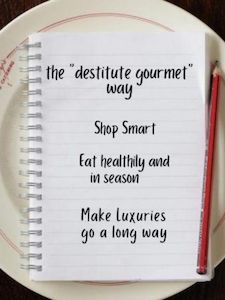Get a Grip on the Grocery Spend and Save More

The weekly grocery shop doesn’t just include food though with new product ranges in the supermarket aisles every week, everything from Flat screen TV’s to outdoor furniture is for sale alongside the milk and bread. The subtle message is that these things are also necessary, just as the milk and bread are necessary, after all the supermarket or grocery store is where we go to buy our essentials.
Most people tell us they aim be in and out of the supermarket in around 45 minutes or less if they can manage it. So if you need to buy on average around 30 items , factoring in the various brands, choices, special offers and items, you’ll have to make somewhere in the order of 205 financial decisions in 45 minutes, that’s roughly one decision every 4.5 seconds:
There is a tendency to simply put all the stuff you fancy in the trolley, with little or no discrimination. Do we really need it? Can we afford it?
If you want to eat well and spend less then you will need to approach the grocery shopping strategically. We’ve received thousands of letters and emails from people who have been staggered at how much they’ve been able to save using the dg principles and how it has transformed their financial outlook.
There are 3 steps or principles, each is simple and easy to implement. It will cost you nothing at all to revolutionise your shopping methods and will save you thousands of hard earned dollars.
The dg Principles are Shop smart, Eat healthily and in season, Make a little of something luxurious go a long way. These 3 “dg" principals can be applied to any household or budget, freeing up cash for other important things in life like debt reduction, education, holidays and handbags.
Before you begin you need to establish what you are currently spending on groceries – Look up your bank or credit card statements for the last month and write down how much was spent on groceries, not just in the “big shop" but including any other smaller trips where you may have picked up one or two items. Total them up to get a true figure of your weeks grocery expenditure – yup takeaways too as they are a food expense. Shop Smart
Plan the menu. For busy people the menu plan is an essential household management strategy.
Often the hardest part of feeding everyone everyday is actually just deciding what to make.
Menu planning is the easiest way to take the stress out of the daily dinner dilemma.
You can jump to the notes on menu planning
Make a list of all your basic “pantry essentials" these are all the things that you need to have in stock to keep the family ticking over – Not what you LIKE, just what you NEED
The essentials list should start with fresh fruit and veg. You can make a wider variety of nourishing meals by combining fresh produce with basics that you already have.
Then add the basics, flour, rice, eggs and seasonings, milk, butter, oil, baking powder, salt, dried pasta … Just the basics that YOU use regularly. Not what you think you might use if you ever get around to dusting off that recipe book…Your pantry staples.
Add a basic range of cereals, canned foods, sauces and spreads. Then you can include a basic range of frozen food – remember, it’s just the essentials – peas and beans are fine, ice-cream and frozen pizza? – They’re going on another list.
The essentials list looks quite different from one household to another as age; life stage and personal taste differ hugely.
After you’ve listed all your essential food items you need to add meat, and then essential cleaning products, pet supplies. Just the essentials though.
Make a list of Luxuries: Record anything your household likes, but is not essential to your survival. Ice cream, wine, fancy cereals, little dangly things to hang in the loo, biscuits, packet meals, fancy oils. kids foods like nuggets or lunch box These lists are really important – it’s impossible to differentiate between a need and a want in the 4.5 seconds thinking time you have in the supermarket aisle. What the lists do is establish quite clearly the priorities, and puts some boundaries around what we buy.
Only shop once a week: If you are serious about saving money you need to decide that you will only go to the supermarket once a week.
If you think you can pop in for 2 minutes and buy one thing you are deluded. You’ll be in the supermarket for 20 minutes and you’ll probably buy 5 or 6 things.
If you run out of something
- Store:
- Destitute Gourmet
